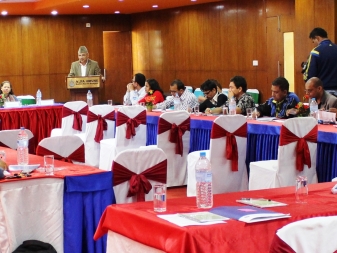
Kathmandu: Tourism and hospitality officials and stakeholders in Nepal have expressed regret at the inability of the sector to fully absorb the skilled workforce produced by some of the leading hotel management schools in the country. According to Shankar Prasad Adhikari, Secretary at the Ministry of Culture, Tourism and Civil Aviation (MoCTCA), the problem has persisted even though the sector has witnessed impressive growth in recent years with a number of national and international chain of hotels and resorts opening across the country. He was speaking at an interaction held at the MoCTCA on June 20 with a team of experts with UNDP’s Support to Knowledge and Lifelong Learning Skills (SKILLS), geared to seek feedback on ways to improve the quality of technical and vocational education and training (TVET) needed for the development of the tourism and hospitality industry in the country.
Secretary Adhikari explained that as a result of the lack of opportunities in the country, students who have completed a four-year Bachelor in Hotel Management course, or a two-year Master’s degree in the subject, or other vocational courses in Nepal, were compelled to head abroad in search of greener pastures. This included graduates of the Nepal Academy of Tourism and Hotel Management (NATHM)—established some 45 years ago with the technical assistance of UNDP/ILO—under the Ministry, he said.
“There is great demand for lower, middle and high-level workforce in the country’s hospitality sector due to the surge in tourist arrivals in the past few years, but we have not been able to match the middle and high-skilled professionals we produce to available jobs in the market, leading them to go overseas in large numbers,” Secretary Adhikari said, adding that this contradictory situation has emerged because of low level of pay and lack of good working environment in Nepal, as well as the general tendency among youths in the country to go abroad to study and work.
Also speaking at the interaction, Executive Director of NATHM, Chudamani Sharma, assured that they have been working in coordination with the Hotel Association of Nepal to come up with measures to address these issues so that trained manpower can be retained. Stating that majority of NATHM’s graduates have done very well for themselves in the hospitality sector in places like North America, Europe, Australia and the Gulf nations, he said, “Hotels in Nepal don’t show a lot of interest in grooming students, by providing them internship opportunities, for instance. Even if they do, the expense allotted to the interns is often minimal. Additionally, trade unions in major hotels can also create all kinds of hurdles in providing internship or job opportunities for new graduates. And this is why we send most of our students to intern at hotels in Malaysia, Dubai, India and Hong Kong, so that they benefit from the experience and exposure.”
Other participants of the interaction—including senior officials of the MoCTCA, the Department of Tourism and the Nepal Tourism Board—all stressed on the need for greater coordination between various government and private entities working for the advancement of the tourism/hospitality industry in order to satisfactorily absorb the skilled workforce produced by hotel management institutes, as well as provide them career advancement opportunities.

